| Listing 1 - 10 of 36 | << page >> |
Sort by
|
Book
Year: 1982 Publisher: Santo Domingo, República Dominicana : FORUM,
Abstract | Keywords | Export | Availability | Bookmark
 Loading...
Loading...Choose an application
- Reference Manager
- EndNote
- RefWorks (Direct export to RefWorks)
Book
ISBN: 9052610193 Year: 1990 Publisher: Schoonhoven : Academic Service,
Abstract | Keywords | Export | Availability | Bookmark
 Loading...
Loading...Choose an application
- Reference Manager
- EndNote
- RefWorks (Direct export to RefWorks)
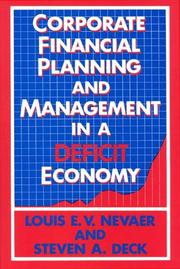
ISBN: 0899302025 Year: 1987 Publisher: New York (N.Y.) : Quorum books,
Abstract | Keywords | Export | Availability | Bookmark
 Loading...
Loading...Choose an application
- Reference Manager
- EndNote
- RefWorks (Direct export to RefWorks)
Budget deficits --- Business planning --- Corporations --- Finance.
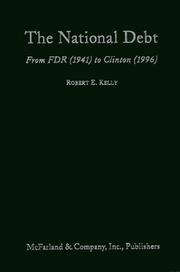
ISBN: 0786406224 Year: 2000 Publisher: Jefferson (N.C.) : McFarland,
Abstract | Keywords | Export | Availability | Bookmark
 Loading...
Loading...Choose an application
- Reference Manager
- EndNote
- RefWorks (Direct export to RefWorks)
Debts, Public --- Budget deficits --- Government spending policy
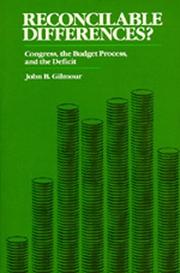
ISBN: 052090995X 0585054274 9780520909953 0520067789 9780520067783 0520069439 9780520069435 9780585054278 Year: 1990 Publisher: Berkeley University of California press
Abstract | Keywords | Export | Availability | Bookmark
 Loading...
Loading...Choose an application
- Reference Manager
- EndNote
- RefWorks (Direct export to RefWorks)
Gilmour traces the development of the congressional budget process from its origin through the emergence of reconcilliation and Gramm-Rudman-Hollings. He shows how changes in process have brought about far-reaching shifts in congressional power, and explains why they have failed to control the explosion of budget deficits.Throughout the last decade budgetary issues have dominated the national political agenda as the deficit has skyrocketed to previously unimaginable levels. In this important book, John Gilmour traces the continuing quest of Congress over the last fifteen years to reform its budgeting system in the hope of producing better policy. He shows that the enactment of the Congressional Budget Act of 1974 and the introduction of the reconciliation procedure in 1980 have produced a budgetary system in which congressional majorities can get what they want, provided only that they can agree on a comprehensive budget policy. From his thorough analysis, Gilmour concludes that, while the reforms have not produced balanced budgets, they have eliminated procedural obstructions to the adoption of a coherent budget.New budget procedures have transformed the way Congress works. Before the reforms of 1974 and 1980, Congress had an extremely fragmented, disintegrated budgetary system in which the budget emerged almost haphazardly from the independent actions of numerous committees. Gilmour shows that reconciliation procedures in the budget process makes total revenue, total expenditures, and the size of the deficit matters of deliberate choice, consolidating decisionmaking to an extent unprecedented in the history of the modern Congress.Yet, despite the striking structural and procedural changes, and despite its highly majoritarian features, the budget process has failed to reduce dissatisfaction with congressional handling of money. Deficits have been larger, not smaller, and overall spending has gone up. Gilmour deftly shows that the massive budget deficits of the Reagan years were due primarily to the failure of the House, the Senate, and the President to agree on how to reduce spending or increase taxes enough to eliminate the deficit. Responsibility for budgetary failure, he argues, must rest with Congress and its inability to reach consensus, not on the new budget process, which, given what we can expect from procedural change, has been quite successful.
Budget --- United States --- Budget deficits --- HISTORY / United States / General.
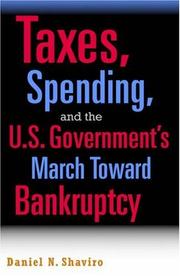
ISBN: 9780511618253 9780521869331 9780521689588 9780511349898 0511349890 0521869331 0521689589 0521689589 1107171296 1281085960 9786611085964 0511350791 0511349025 0511348053 0511573545 0511618255 Year: 2007 Publisher: New York : Cambridge University Press,
Abstract | Keywords | Export | Availability | Bookmark
 Loading...
Loading...Choose an application
- Reference Manager
- EndNote
- RefWorks (Direct export to RefWorks)
The United States is moving toward a possible catastrophic fiscal collapse. The country may not get there, but the risk is unmistakable and growing. The 'fiscal language' of taxes, spending, and deficits has played a huge and under appreciated role in the decisions that have pushed the nation in this dangerous direction. Part of the problem is that by focusing only on the current year, deficits permit politicians to ignore what is looming down the road. The bigger problem lies in the belief, shared by people on the left and the right alike, that 'tax cuts' and 'spending cuts' lead to smaller government, when in fact the characterization of any new policy as a change in 'taxes' or in 'spending' is purely a matter of labeling. This book proposes a better fiscal language for US budgetary policy, rooted in economic fundamentals such as wealth distribution and resource allocation in lieu of 'taxes' and 'spending'.
Fiscal policy --- Taxation --- Budget deficits --- Business, Economy and Management --- Economics
Book
ISBN: 0231070209 Year: 1990 Publisher: New York (N.Y.) : Columbia university press,
Abstract | Keywords | Export | Availability | Bookmark
 Loading...
Loading...Choose an application
- Reference Manager
- EndNote
- RefWorks (Direct export to RefWorks)
Budget deficits --- Mixed economy --- Unemployment --- Effect of inflation on

ISBN: 0739107518 9780739107515 Year: 2004 Publisher: Lanham (Md.): Lexington books,
Abstract | Keywords | Export | Availability | Bookmark
 Loading...
Loading...Choose an application
- Reference Manager
- EndNote
- RefWorks (Direct export to RefWorks)
Fiscal policy --- Budget deficits --- Budget surpluses --- Fiscaal beleid --- Fiscaal beleid. --- Fiscal policy - Case studies --- Budget deficits - Case studies --- Budget surpluses - Case studies
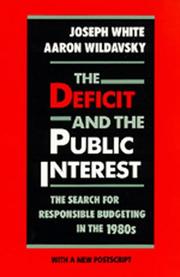
ISBN: 0520065336 0520076508 0585043876 Year: 1989 Publisher: Berkeley ; Los Angeles ; London New York University of California Press Russell Sage Foundation
Abstract | Keywords | Export | Availability | Bookmark
 Loading...
Loading...Choose an application
- Reference Manager
- EndNote
- RefWorks (Direct export to RefWorks)
Political time is counted, not in years, but in issues--the depression defined the political era of the 1930s just as the cold war did the 1950s and civil rights the 1960s. Today the federal budget looms as the dominant issue by which all others are considered and has become a concern which catalyzes debate again and again in our nation's capital. In this definitive new work, Joseph White and Aaron Wildavsky describe and analyze the struggles over taxing and spending from Carter's last year through the Reagan administration. The battle of the budget is largely about how we define the role of the government and its relationship to the people. It is a story of congressional horsetrading, partisan posturing, and technical tricks that affect billions of dollars. It is also a story of politicians operating within constraints set by both public opinion and political interpretation of economic reality. Though budgeting has always been important, its impact on the national agenda has grown dramatically in the last decades. Based on extensive interviews with participants and thorough use of documentary sources, this book both explains how budgeting works so the reader can see what is at stake in seemingly arcane disputes and locates budgeting within larger ideological trends in American society. It also explains the relationship of the budget to media, party and policy activists and explores the ways in which the deficit represents a crisis of self-confidence in the ability of our institutions, preeminently Congress and the presidency. Along the way, it provides a uniquely comprehensive account of the entire budget problem, exploring Gramm-Rudman, tax reform, and the continuing stalemate around this issue. 'The Deficit and the Public Interest' offers a wide-ranging "solution" to the deficit that encompasses several ideas: the authors demonstrate that institutions have performed better than their members and critics believe, and they contend that extreme solutions would li
Budget deficits --- Budget --- Government spending policy --- United States --- Political Science --- Law, Politics & Government --- Public Finance
Book
ISBN: 3161456777 Year: 1990 Publisher: Tübingen : Mohr,
Abstract | Keywords | Export | Availability | Bookmark
 Loading...
Loading...Choose an application
- Reference Manager
- EndNote
- RefWorks (Direct export to RefWorks)
Budget deficits --- Economic development --- Employment (Economic theory) --- Fiscal policy --- Foreign exchange --- Inflation (Finance) --- Mathematical models.
| Listing 1 - 10 of 36 | << page >> |
Sort by
|

 Search
Search Feedback
Feedback About UniCat
About UniCat  Help
Help News
News